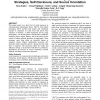Free Online Productivity Tools
i2Speak
i2Symbol
i2OCR
iTex2Img
iWeb2Print
iWeb2Shot
i2Type
iPdf2Split
iPdf2Merge
i2Bopomofo
i2Arabic
i2Style
i2Image
i2PDF
iLatex2Rtf
Sci2ools
68
Voted
CHI
2009
ACM
2009
ACM
Social responses in mobile messaging: influence strategies, self-disclosure, and source orientation
This paper reports on a direct test of social responses to communication technologies theory (SRCT) with mobile messaging. SRCT predicts that people will mindlessly respond to computers in social ways that mirror their responses to humans. A field experiment (N=71) using participants' own mobile phones compared three influence strategies (direct request, flattery, and social norms) in the context of asking intimate questions of participants. These messages came from either an ostensibly human or computer sender. Flattery significantly increased selfdisclosure when ostensibly sent by a human, but not when from a computer. The interaction effect for sender and influence strategy is inconsistent with SRCT's predictions. Implications for theories of source orientation, research methods, and future research are discussed. Author Keywords social responses to communication technologies, persuasive technology, mobile phones, self-disclosure, flattery, mobile messaging, source orient...
CHI 2009 | Human Computer Interaction | Keywords Social Responses | Mobile Messaging | Mobile Phones |
| Added | 24 Nov 2009 |
| Updated | 24 Nov 2009 |
| Type | Conference |
| Year | 2009 |
| Where | CHI |
| Authors | Attapol Thamrongrattanarit, B. J. Fogg, Claire Carlson, Dean Eckles, Doug Wightman, Marcello Bastéa-Forte |
Comments (0)

